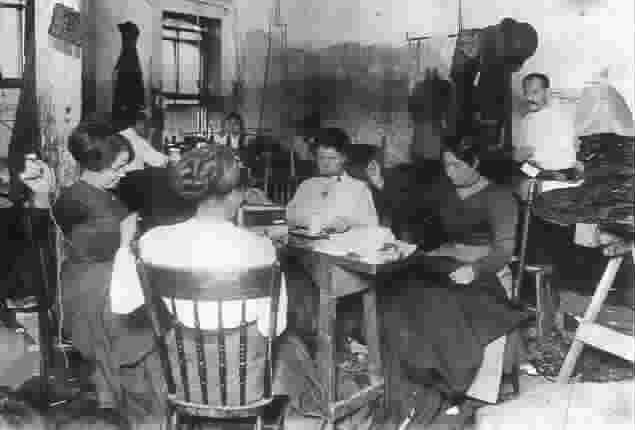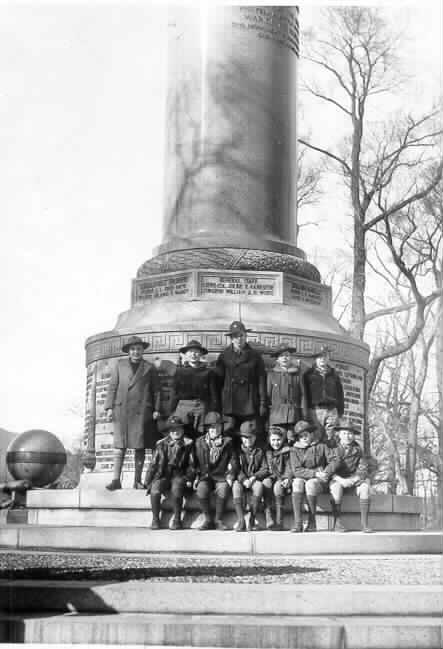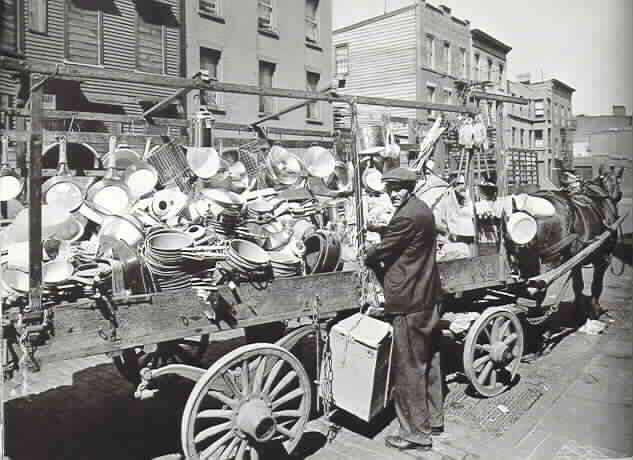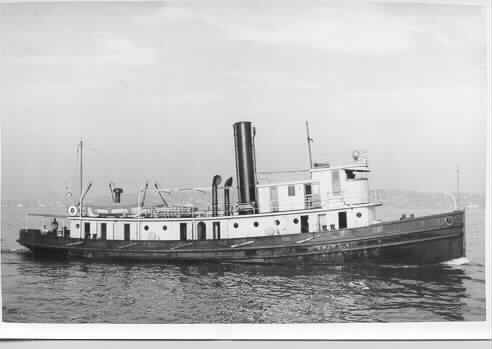| Home
Immigration
Hometowns
Voyage
Arrival
Life in Brooklyn
History
Neighborhoods
Occupations
1850 - 1900
1900 - 1950
1950 - 2000
Assimilation
Family
Migration
Brooklyn Today
Research
Family Tree
Bibliography
Guest Book
Back to Geocities |
|
Occupations:
1900-1950 
Piecework - Taken by Jacob
Riis
Home
- Extended families often lived in the same building or
apartments.
The 1918 Flu
- My grandmother's older sister was killed by the 1918 Flu,
also known as the Spanish flu.
The flu seemed to strike first in Spain and soon spread to major cities in the United States. Over one half
million Americans were killed by this pandemic which struck at the end of World War I. It
is estimated that over 20 million people died worldwide.
School
Primary School
- St. Anselm’s Grammar School

Boy Scouts 1920s - Family photo taken in front of a monument to
World War One dead.
Secondary School
- Bishop McDonald High School
Trade Schools/College
Child LaborHome based Piecework
The National Child Labor committee, organized in 1904,
exposed the cruelties that child suffered in the workplace but reform came slowly. By
1914, 34 states prohibited children under 14 working and limited hours to 8 for children
under 16. Most states required minors to go to school
In our family, according to the
census, the youngest children reported working were at age X for boys, and Y for girls.
Self Employment/Small Business
Grocer
Mechanic
Butcher’s Helper
Saloon/Liquor Store Owner
- Small saloons were all over the New York City area and
apparently were an easy thing to start. Prohibition in 1920 put an end to this until 1933
and none of my relatives reentered the business
- Stella Dacci, 1915, NYC
- Pietro Pomarico, 1905, Brooklyn
Junk Dealer

Traveling Tin Shop - Brooklyn 1936 Taken by Bernice Abbott as
part of a WPA funded photographic project to photograph New York City
- Giovanni Busicchio, 1905, Elizabeth
This was a family business and the son was the cart driver.
Apparently this business was run out of their home.
Junk dealers would buy rags, bones, junk then would sell it
to specialized wholesalers. Junk would be melted. Rags were transformed to pulp in paper
mills and bones were sold to soap manufacturers.
My father remembers people still doing this with a cart in
Brooklyn during the 1950s.
Refrigerator Repair
- Anthony Pomarico
- Major new home conveniences meant lots of work for repair
people of all types.
Store Owner
Agriculture
Farmer
Transportation
Steamship Company
- Henry Gill
- Ocean Steamship Company of Savannah, GA
- Commercial agent, General Freight
- Pier 46, north river, NY
- Booth Steamship Ltd.
- Asst. to President

U.S. Patrol Boat Argus - Circa 1950
-Part of Army Corps of Engineers fleet patrolling NY Harbor
Longshoreman
Horse Drawn Trolley Driver
- Michael Gill
- Brooklyn Rapid Transit
Wagon Driver
- Joseph Busicchio, 1915, Elizabeth
- Worked in the family junk business
Elevator Operator
- Rocco Dacci, 1920
- NYC Courthouse
Truck Driver
Manufacturing
Bag Factory
- Stella Blumetti, 1920
- NYC
Bookbinder
- Lena Blumetti, 1925, age 21
- NYC
Paper Box Factory
- Pasters, 1915
- Lena Blumetti(daughter of Delia)
- The paper box factory was located on the same block as the
Blumetti Family almost directly behind their house.
Rag Sorter
- Rosa Blumetti, 1915, age 43
- Elizabeth, NJ
Value Company?
- Packer, Vincenza Pomarico, 1920
Shirt Factory
- Machine operator, 1910, Mary Blumetti
- Operator, 1915, Angelina Busicchio, Elizabeth
- The work was seasonal, three months in the summer and three
months in the winter. Workers made about 5$/week for working 10-13 hour days.
Standard Oil Company
- Bayonne, NJ
- Martin Murphy
- Accident on the Job
- 1927
Gas Works(refinery)
- Elizabeth, NJ
- Francesco Blumetti
- Accident on the Job?
- 1913
Service Industries
Cleaning
Book binder
- Sal Dacci, 1920
- NYC
- Lena Blumetti, 1925
Advertising
- Rose Blumetti Pomarico, 1934
- National Card Novelty Company, 15 street and 9th Ave., NYC
Armed Services
WWI Army
- Men born between 6/6/1886 and 8/28/1897 were registered for
the draft
- Dominick Sogga
- John Gill, Fighting 69th w/Joyce Kilmer
The 69th regiment of the New York National Guard saw its
greatest glory in World War I. 95% of its members were of Irish heritage and it was one of
the first units sent to Europe.
In an unprecedented 181 days of direct contact with the
enemy, the 69th changed its headquarters 83 times and gained 55km in trench warfare. It
went overseas with 3500 men and it suffered 3500 casualties with 644 killed and 2857
wounded.
WWII Air Force
- Frank Sogga, Ordinance Officer
WWII Coast guard
- Henry Gill, USS: NJ, NM, MN, Prometheus
WWII Navy
- Brooklyn Navy Yard
- Opened in 1801 in Wallabout Bay
WWII Merchant Marine
|
![]()



